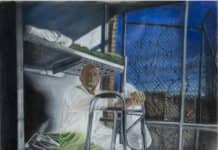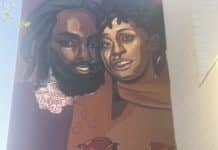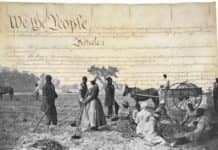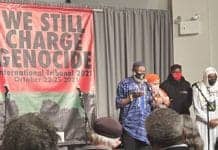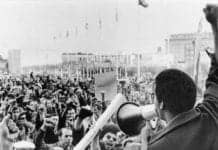by Mumia Abu-Jamal
Unless you lived in North Philly, in the projects east of Richard Allen and north of Spring Garden, perhaps the name of Ruth ‘Ma’ Ballard would be unfamiliar to you.
But if you lived there, if you had the pleasure of knowing her, of seeing her smile, of hearing her sweet Southern voice, you’d know that you’ve met someone special.

In this world of chaos and drama, she seemed the calm at the eye of the storm. Like a strong tree, well-rooted, few could shake her.
In the beginning, when the projects were new, bright and shining, the Ballards and the Cooks were among the first families to move there, up from uncertainty in the dreaded South, the last few rivers of the great Black flood north.
Two young mothers, Edith and “Dot” (what she called Ruth), met each other in this new, unknown place and became friends for life. They would talk to each other over the clothesline, fresh wash flapping in the morning breeze.
They raised families: children and then grandchildren, children of North and South, children of the projects, children of the storm.
Back then, children could and would be disciplined by any adult in the neighborhood. And woe to the boy or girl who earned a pop from one adult, for you knew that you’d get some more when you got home!
Everybody called her “Ma” Ballard, for she radiated calm, reassuring motherly love that made her legendary in the projects.
But Ma Ballard wasn’t big on beatings. She could look at you and make you stand still. It wasn’t that you didn’t want to make her mad. You didn’t want to disappoint her.
You would do anything to bring that smile back to her face – that brown, beautiful smiling face, the folds in the corners of her eyes, that star-like twinkle in those eyes.
She was special – because she was.
Her laugh was special; her love was special; her wisdom was special – because it made you feel special.
I’m tempted to say that they don’t make ‘em like her anymore – tempted –but I won’t say that. Honestly, because I don’t know. I think so, but I’m not sure.
But I know this: She made the neighborhood better; she made the community better. She made you want to do better and be better.
She was a tiny woman, the kind people called “short.” But I never thought of her as such.
Her laugh was special; her love was special; her wisdom was special – because it made you feel special.
Some people fill the room with their aura; they radiate. She was such a one.
I’m blessed to have known her, my mother’s dearest friend. I can still hear their laughter together, the sweetness in it, the joy of living in it, like starlings tweeting in the dawn.
Our families join the Ballards in mourning her passing. She is never to be forgotten: “Ma” Ballard!
© Copyright 2013 Mumia Abu-Jamal. Read Mumia’s latest book, “The Classroom and the Cell: Conversations on Black Life in America,” co-authored by Columbia University professor Marc Lamont Hill, available from Third World Press, TWPBooks.com. Keep updated at www.freemumia.com. For Mumia’s commentaries, visit www.prisonradio.org. For recent interviews with Mumia, visit www.blockreportradio.com. Encourage the media to publish and broadcast Mumia’s commentaries and interviews. Send our brotha some love and light: Mumia Abu-Jamal, AM 8335, SCI-Mahanoy, 301 Morea Road, Frackville, PA 17932.

 Store
Store




